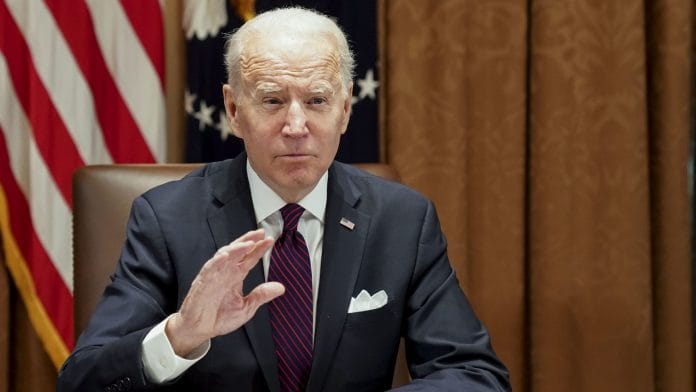India-US relations seem to be entering a ‘shaky’ phase; and for the US President Joe Biden looking from the Wild West, India appears to be shaky vis a vis the Russia-Ukraine crisis.
“The Quad is — with the possible exception of India being somewhat shaky on some of this… but Japan has been extremely strong, so has Australia, in terms of dealing with Putin’s aggression. We presented a united front throughout NATO and the Pacific,” Biden said while addressing a meeting of US business leaders in Washington.
Biden lauding Quad’s unity should be seen with Japanese Prime Minister Fumio Kishida’s recent India visit during which he raised the issue of the humanitarian crisis in Ukraine. What appears to be a genuine cause of worry, should also be seen as a veiled suggestion to New Delhi for supporting the US’ stand on the war in Europe instead of taking the non-aligned route. New Delhi continues to be firm on its non-aligned stand by not supporting a Russian resolution on the humanitarian issue. China supported the resolution, days after the Biden-Xi Jinping talks seeking to wean China away from Russia.
Yet another Quad member, Australia, announced an enhanced investment package during the second India-Australia Summit but spoke very little about the Russia-Ukraine crisis. Both countries reaffirmed their commitment to the success of Comprehensive Strategic Partnership.
Also read: Russia fighting conventional war against unconventional Ukraine has a lesson for India
US is shaky…
In a clear departure from Trump administration’s policy of confronting Chinese hegemony and economic domination, Biden has begun to please China by reiterating US commitment to one-China policy ‘guided by the Taiwan Relations Act, the Three Joint Communiqués, and the Six Assurances’ and greater economic engagement. There seems to be no commitment from Beijing to refrain from using coercive methods and intimidation against Taiwan. It remains to be seen what the Biden administration will do in the event of Beijing doing to Taiwan what Russia did to Ukraine, as Taiwan too is not a NATO member. In August 2003, the George Bush administration submitted a letter to Congress, designating Taiwan as a major non-NATO (MNNA) ally.
Beijing has made clear its resolve to settle the ‘Taiwan question and realising China’s complete reunification (which) is a historic mission and an unshakable commitment of the Communist Party of China’.
The ‘shaky’ nature of Biden’s foreign policy is once again evident as he prefers to overlook China’s history of using PLA’s muscle and economic coercion to repress political dissidents, ethnic groups, neighbours and economic beneficiaries through BRI projects.
The US should take note of the fact that Quad members included, the world is witness to its failure in mitigating the crisis and come to the rescue of Ukraine or initiate the de-escalation process.
Also read: Fate of Ukraine will tempt China on Taiwan. And US might not be in a position to push back
…from Afghanistan to Galwan
The ‘shaky’ foreign policy of the Biden administration was evident from the time he took over nearly a year ago. Although the US’ withdrawal from Afghanistan was no surprise, the abrupt exit without holding any joint consultations with allies and NATO members speaks volumes of Biden administration’s unilateralism. After the botched-up withdrawal, without consulting the Quad members, the US announced the formation of Quad-2 with US-Afghanistan-Pakistan-Uzbekistan as members. This ‘shaky’ Quad was a non-starter. Then the White House suddenly launched the Australia-UK-US (AUKUS), again without having a word with Quad members and brazenly stepping on the toes of France — torpedoing its submarine contract with Australia.
Even during the India-China conflict in Galwan, in Eastern Ladakh, US and the other three Quad members failed to respond in favour of New Delhi. Ironically, in the current crisis, both India and China seem to be on more or less the same page as far as suggesting a middle path and resolution through diplomatic engagement is concerned.
While no NATO member, not even the US, is willing or ready for a direct military confrontation with Russia, the White House under Biden is arming Ukraine to teeth to fight a much stronger Russian army. The result of this lopsided policy has been more death and destruction in major Ukrainian cities, including the capital Kyiv.
Biden’s flip flop on China could be attributed to his belief, albeit naïve, that by pandering to Beijing’s ego, the US can demolish the Russia-China axis. China, and not Russia, should be considered a greater threat to the US-led liberal and democratic world order. It is nobody’s argument that the present world order is the best one to lead the globe towards peace and prosperity. But it surely allows forging institutions that will strengthen democracy and liberalism and substitute aggression with diplomatic engagement to resolve crisis.
Biden is free to chart a foreign policy that suits his regime the best but should not ‘shake’ the very foundations on which the present post-Second World War global order stands.
The author is the former editor of ‘Organiser’. He tweets @seshadrichari. Views are personal.
(Edited by Anurag Chaubey)






